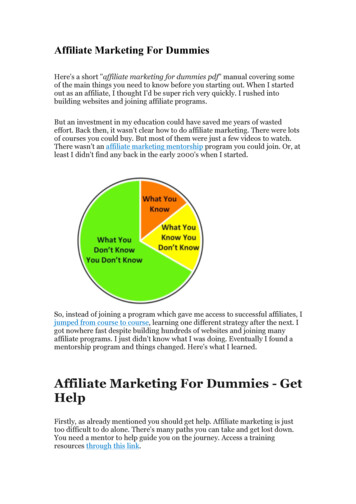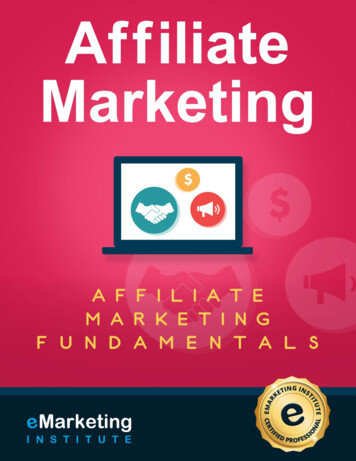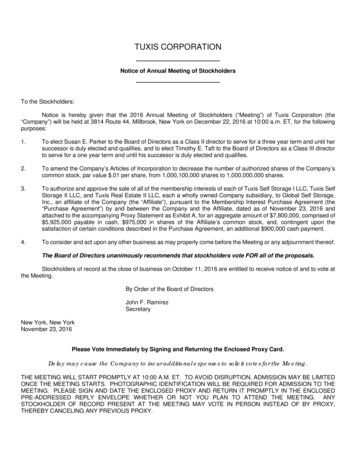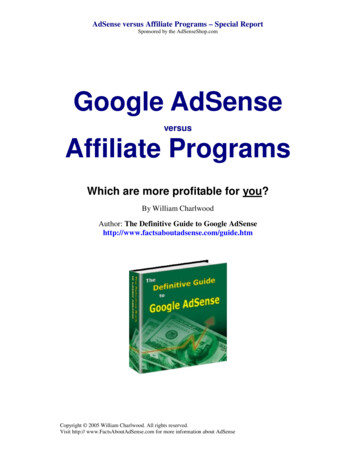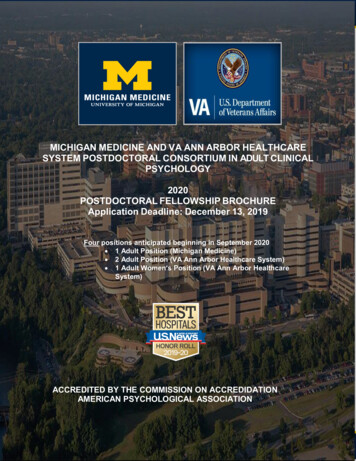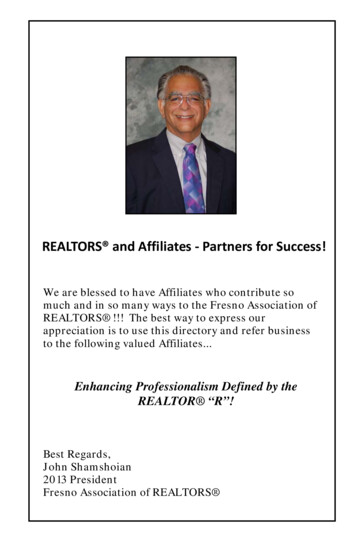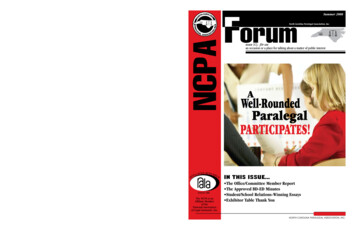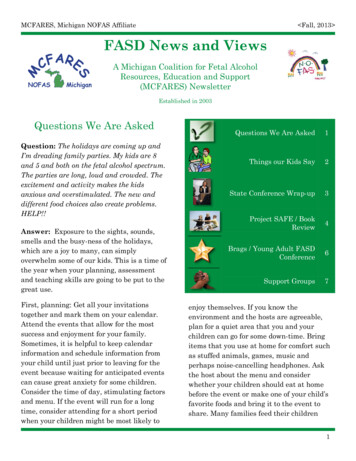
Transcription
MCFARES, Michigan NOFAS Affiliate Fall, 2013 FASD News and ViewsA Michigan Coalition for Fetal AlcoholResources, Education and Support(MCFARES) NewsletterEstablished in 2003Questions We Are AskedQuestion: The holidays are coming up andI’m dreading family parties. My kids are 8and 5 and both on the fetal alcohol spectrum.The parties are long, loud and crowded. Theexcitement and activity makes the kidsanxious and overstimulated. The new anddifferent food choices also create problems.HELP!!Answer: Exposure to the sights, sounds,smells and the busy-ness of the holidays,which are a joy to many, can simplyoverwhelm some of our kids. This is a time ofthe year when your planning, assessmentand teaching skills are going to be put to thegreat use.First, planning: Get all your invitationstogether and mark them on your calendar.Attend the events that allow for the mostsuccess and enjoyment for your family.Sometimes, it is helpful to keep calendarinformation and schedule information fromyour child until just prior to leaving for theevent because waiting for anticipated eventscan cause great anxiety for some children.Consider the time of day, stimulating factorsand menu. If the event will run for a longtime, consider attending for a short periodwhen your children might be most likely toQuestions We Are Asked1Things our Kids Say2State Conference Wrap-up3Project SAFE / BookReview4Brags / Young Adult FASDConference6Support Groups7enjoy themselves. If you know theenvironment and the hosts are agreeable,plan for a quiet area that you and yourchildren can go for some down-time. Bringitems that you use at home for comfort suchas stuffed animals, games, music andperhaps noise-cancelling headphones. Askthe host about the menu and considerwhether your children should eat at homebefore the event or make one of your child’sfavorite foods and bring it to the event toshare. Many families feed their children1
MCFARES, Michigan NOFAS Affiliatebefore attending an event so that children donot arrive at a party hungry or cranky.Practice appropriate conversation skills,such as introductions, with your childrenprior to the party. You can also “introduce”your children to guests via pictures beforeyou arrive at the party so they may be morefamiliar with faces when you arrive.Second, assessment: Consider the activitiesthat will likely occur at the gathering andhow your kids might respond to theseactivities. If family gift-giving createschallenges for your children, perhaps you canarrive after gifts have been opened and theirgifts can be discreetly placed in your vehicleand opened when you decide the time isappropriate. Will there be guests at theevent who as yet do not understand thechallenges your children experience? Ifpossible, speak to them before the event orprivately during the event to explain howpre-natal exposure to alcohol has affectedyour children. Engage their assistance increating a safe, accepting environment.Assess the environment. Are there potentialhazards such as pets that could scare yourchildren or that they could potentially hurt,electronics that they might have unrestrictedaccess to, medications or other potentiallyharmful items? If such concerns are present,consider asking the hosts to remove thedanger or, if that’s not possible, be preparedto provide close supervision of your children.Third, teaching: This is where you get toeducate your friends and family about howpre-natal exposure to alcohol has affectedyour children. Explain the cause of fetalalcohol spectrum disorders and the range ofchallenges that an individual might Fall, 2013 experience. Share as much as you’recomfortable sharing about your children’ssensory, learning and behavioral challengesand the interventions you’ve put in place tohelp them be successful and safe. For thosewho want to learn more, suggest some ofyour favorite websites and resources.Best wishes for a safe and happy holidayseason.National Christmas Tree – Washington DC 1983Things Our Kids SayJamie, 11 years old, upon receivinghis sandwich at lunch: “There’snothing in this BLT besides bacon,lettuce, and tomato!”2
MCFARES, Michigan NOFAS Affiliate Fall, 2013 40 Years and Beyond: Fetal Alcohol Spectrum DisordersConference Held in MichiganThe Michigan Fetal Alcohol Spectrum Disorders Task Force presented a day-long conference onSeptember 12, 2013 entitled “Our Journey of 40 Years and Beyond: Living and Learning withFASD”. The conference was attended by over 220 people including parents, individuals withFASD, teachers, nurses, doctors, social workers, and community program staff. Sponsors of theconference included local parent support groups from Ann Arbor and Grand Rapids, CARE ofSoutheastern Michigan, the Developmental Disabilities Institute, MCFARES/NOFAS MichiganChapter, the Great Lakes FASD Regional Training Center, Merrill Palmer Skillman Institute,and the Michigan Departments of Community Health, Human Services and Education.The conference marked the 40th anniversary since the term Fetal Alcohol Disorder was used byDr. Kenneth Lyons Jones and Dr. David Smith in the first U.S. article describing the impact ofprenatal alcohol exposure on several children born to mothers who were severely alcoholic. Dr.Jones, who currently serves as the chief of the University of California San Diego’s Division ofDysmorphology/Teratology and has written over 400 scientific publications, gave the key noteaddress highlighting what we have learned about the impact of prenatal alcohol exposure onindividuals throughout their lives and prevention and intervention best practices. Otherspeakers included Dr. Mark Sloane from the Children’s Trauma Assessment Center who spokeabout the intersection of genetics, toxic traumatic stress and prenatal drug and alcohol exposureand Dr. Sally Burton-Hoyle from Eastern Michigan University and a member of the nationalInteragency Autism Coordinating Committee who presented on understanding behavior ascommunication and positive ways to support people. Dan Dubovsky, FASD specialist from theSAMHSA FASD Center for Excellence, closed out the conference with a session on building onthe strengths of individuals with FASD and their families to increase abilities and inclusion intheir communities.Breakout session included panels led by parents and adults who have FASD on communityprograms, representatives from the Michigan Partners for Freedom speaking about selfdetermination, transition planning, diagnosing teens and adults, understanding the complexitiesof interventions, estate planning, and an update on Michigan FASD programs by the FASDState Coordinator. A panel of adults with FASD featured the experiences of three of the foundingmembers of SAFA, Self-Advocates with FASD in Action living and learning with FASD.The day was very successful with many positive comments about the quality of speakers andpresentations and the valuable information that was shared.Written by Ann Carrellas, LMSW, Research Assistant, Developmental Disabilities Institute, Wayne StateUniversity, Detroit, MI. If you wish to contact Ann, her email address is: do9921@wayne.edu3
MCFARES, Michigan NOFAS Affiliate Fall, 2013 MCFARES Celebrates FASDay in Macomb County at an OpenProject S.A.F.E. EveningOn Saturday, September 14th, our familiesand guests enjoyed a wonderful pot-luckmeal together, our kids had time to play inthe gym and we all enjoyed a fun game of“What do You Know about MCFARES andFASD?” Everyone enjoyed trying to answerthe questions for a chance to win prizes.Project S.A.F.E. meets monthly, typically onthe 2nd Saturday of the month. ContactCharisse at charisse@mcfares.org for timesand location.Book Review: When Rain Hurts by Mary Evelyn GreeneMary Evelyn Greene’s book, When RainHurts: An Adoptive Mother’s Journey withFetal Alcohol Syndrome is a story that is verysimilar to ours. Greenecaptured the frustrations,challenges and delays of theadoption process while givinga very personal feeling to theexperience. As with manyadoptive families, the Greene’swere assured that they wereadopting two healthy childrenonly to discover fairly quicklythat one of their children hadsome very seriousdevelopmental and behavioralchallenges. Greene details their search for ananswer to their son’s challenges and herexperience attempting to find treatments forhis needs. The family seeks help from some ofthe most well-known professionals ininternational adoption and in diagnosingfetal alcohol spectrum disorders. They arerelentless in their search foreducational and therapeutic strategiesthat will help their son. Greene isbrutally open about her feelings as shejourneys through the adoption process,through the behavioral challenges andinto the diagnostic process.The book is a great read for anyadoptive parent especially those whoare struggling with behavioralchallenges. Family members,therapists and educationalprofessionals should also read this book togain an understanding of challenges thatmany adoptive families face.4
MCFARES, Michigan NOFAS Affiliate Fall, 2013 BragsGabbyJoshuaGabby S., 10 years old, wasrecently appointed captain ofthe service squad at herelementary school.Joshua K., 19 years old,recently earned his yellowbelt in karate. He’s beentaking lessons for about 4months.Congratulations, Gabby!Congratulations, Joshua!Young Adult FASD ConferenceWhat a great time I had at the Young AdultFASD conference this past August in Ohio.Over 25 individuals and their supports spenta great weekend at the Widewater RetreatCenter. Some of us were shy at first, but thatchanged afterthe first meal,from then on,we were thereto be with ourpeers and getsomeinformation.A lot of it Ihadn'tthought muchabout, but Ilearned howto: advocatefor myself, what to do if stopped byauthorities, interviewing skills, checking andother money skills, how our brains aredifferent and more. For fun we could swim,paddle boat, fish, do archery, craft, sing atthe campfire, make s'mores and more.andmake sure your room's clean so you can winthe golden broom (see picture) award!!!It was great to meet other people and theirsupports who know what my life's likewithout going into detail, I rarely get that. Irealized that there are other people like meand I felt kinda normal!I hope they have it again and everyoneshould try to get to some event like thissooner rather than later.Written by Andy P.5
MCFARES, Michigan NOFAS Affiliate Fall, 2013 Support Groups for FASD in Michigan(not all groups are specifically for FASD support)(Please phone or email contact person prior to attending to ensure that group is still meeting. Ifinformation has changed, please email Charisse at Charisse@mcfares.org).Alpena CountyFASD Family Support Group, Meets 3rd Wednesday of each month; 6:30 – 8 p.m., Thunder BayTransportation Authority, 3022 US23 S, Alpena. Contact Mary Schalk atmaryschalk@frontier.com 989-734-2877 for more information.Eaton CountyEaton County Foster Adopt Support Group, Meets 1st Thursday monthly, 6 – 8:30 p.m. Pot-luckdinner at 6:00 p.m. Group/training at 6:30 p.m. Childcare available. Eaton Intermediate SchoolDistrict, 1790 Packard Highway, Charlotte, MI 48813. Located right next door to Walmart.Contact Michelle for more information at besa 93@yahoo.com.Kent CountyWest Michigan FASD Support Group, Meets 3rd Tuesday of each month, 7 – 8:30 p.m.,Westminster Presbyterian Church, 47 Jefferson Avenue, Grand Rapids, MI 49503. ContactSandy Kezenius, 616-874-9522; Corry Tait, 616-550-4273; or Barbara Wybrecht, 616-241-9126 orbmwybrecht@gmail.com for more information.Self-Advocates with and FASD in Action (SAFA), generally meets on the 3rd Tuesday of eachmonth. The meeting is for adults age 18 and up who have an official FASD diagnosis. ContactRob Wybrecht for more information, rob1195@yahoo.com.
MCFARES, Michigan NOFAS Affiliate Fall, 2013 Macomb CountyProject SAFE (Supportive Activities for Everyone), Generally on a Friday or Saturday eveningfrom 5:30 – 8:30 p.m. at various locations in Macomb County. Families meet for pot-luck dinnerfollowed by supervised play for the children and support group time for adults. Contact Charisseat Charisse@mcfares.org or 586-329-6722.Brunch Bunch, Monthly, 2nd Tuesday, 9 a.m. – 11 a.m., In Clinton Township, Contact Charisse atCharisse@mcfares.org or 586-329-6722 for location details.Washtenaw CountyAnn Arbor Support Group, Meets 4th Wednesday of each month except November (meets 3rdWednesday) and December (no meeting), 7 -9 p.m. St. Joseph Mercy Hospital, Education Center,Classroom #5, 5305 East Huron Drive. Contact Betsy for more information,betsysoden@juno.com.On-line SupportFamilies and Supports Affected by FASD: http://groups.yahoo.com/group/FaSAFASDNote: no liability is assumed with respect to use of or inability to use the information contained in thisnewsletter. Although every precaution has been taken, the authors assume no liability for errors oromissions. No liability is assumed for damages resulting from the use of the information containedthereinUpdated 6/13MCFARES is the Michigan NOFAS Affiliate
MCFARES, Michigan NOFAS Affiliate Fall, 2013 MCFARES Member AgenciesArc Services of Macomb(fiduciary)Macomb County Office ofSubstance AbuseFamily members of affectedindividualsOakland University School ofNursingMacomb Intermediate SchoolDistrict, Early OnMacomb County CommunityMental HealthMCFARES needs you.Call us at 586-329-6722to find out how you canhelp.Fraser Public SchoolsMacomb Family ServicesMacomb County HealthDepartmentMadonna UniversityMCFARES44050 N. GratiotClinton Township, MI 48036RECIPIENTAddress Line 1Address Line 2Address Line 3Address Line 4
Southeastern Michigan, the Developmental Disabilities Institute, MCFARES/NOFAS Michigan Chapter, the Great Lakes FASD Regional Training Center, Merrill Palmer Skillman Institute, and the Michigan Departments of Community Health, Human Services and Education. The conference marked the 40th anniversary since
